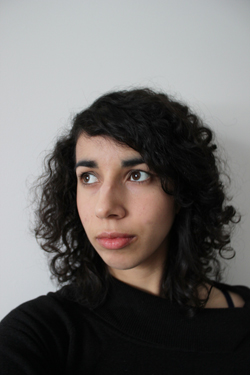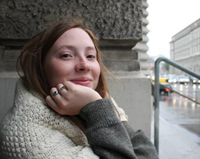Poetry and the Vowels of Colour:
Claire Macdonald in Conversation
with Rebecca Salazar

Malahat marketing assistant Claire Macdonald talks with 2015 Open Season Poetry Award winner Rebecca Salazar about her prize-winning poem, "synaesthesia." The poem will appear in Issue 190, Spring 2015 of the Malahat.
Click here for the original announcement page on Rebecca Salazar's Open Season Award win.
How do you anticipate that winning the Open Season Award for Poetry will affect your current writing projects?
I’d first like to thank the Malahat judges, and particularly Jan Conn, for her comments on my poem. I don’t know if I can say that winning this contest will affect my writing directly, but the recognition and the knowledge that my poems are being read and enjoyed is incredibly motivating. The responses I’ve received are reassuring me, when I had doubts about the poems I am currently writing, and have made me more excited to work on them.
Do you yourself experience the neurological phenomenon synaesthesia? If yes, when did you first discover this mixing of senses? If not, how did you first hear about the condition?
Some of my earliest memories are synaesthetic associations. Sounds and words have particular colours to me, and sometimes textures, or levels of light. I remember using it as a sort of mnemonic device when I was a child learning English—my first language is Spanish—to remember how words were spelled, and what they meant. It remains part of the way I write, and will often rewrite entire poems for having too many vowels of the wrong colour, or some other such offense, even when I realize these are details nobody else might interpret this way. This poem was my most overt experiment so far in trying to match the word-colours with colours of sounds or physical sensations in the poem. The idea was to try conveying specific associations or sense-blendings, and I’m wildly curious about how other people reading the poem will experience them.
What inspired the choice of non-capitalization throughout the poem? What effect is intended through this stylization?
I first started eschewing capitalization because I couldn’t like the way some poetry capitalizes the first letter of every line, even when a sentence is enjambed over the line break. Some writers execute this beautifully, but in my own work it felt stilted, as though it tripped up the drive of the syntax. At different times, I’ve toyed with a total absence of capitalization, and even punctuation, which I eventually discovered was too much for me. But it was helpful, insofar as I became more aware of where the impulse of a sentence can peak or fold, and of how I could manipulate these through syntax alone. Most recently, I’ve made friends with capitalizing the first letter of each sentence, and have been reincorporating it into my poems.
Regarding the use of the second person pronoun, did you have a particular person in mind when addressing “you”? How self-directed are the statements in this poem?
This is another writing habit of mine that I’ve lately been interrogating. The idea with a poem like this one is to put the reader in the place of the speaker, or the “you,” so as to have them experience what is happening in the poem first-hand. Using second-person to achieve this usually also implies using an imperative mode, and I try to aim for guiding the reader, the way a hypnotist might do to their subject. Maybe a better comparison is the genre of choose-your-own-adventure novels (I may have read a few too many of these), which are usually written in second person, and allow the readers quite a bit of agency while also inserting them directly into the narrative. Sometimes, I worry about sounding too commanding, but am also wary of shying away from that kind of assertiveness when a poem requires it.
As managing editor of Qwerty Magazine and editorial assistant at The Fiddlehead, you balance between both hemispheres of the literary world: publishing and writing. Have you always had an interest in the publishing and editing scene or did this develop after exploring your identity as a writer? How do you find balance in being on both sides of this exchange?
My venture into publishing began when a group of writer friends and I were bemoaning the lack of resources or publication outlets for new writers in Northern Ontario. Starting out with minimal funding and a total naiveté about the publishing industry, we created a small journal, Sulphur, which I’m proud to say is now part of a growing literary community in Sudbury. It was a thrill, learning as we went, and getting to meet so many other local writers as we emerged from the slag heaps with them. Getting to work with Qwerty and The Fiddlehead is confirming to me that I do want to live in both hemispheres, so to speak. I’ve learnt, among other things, how to read differently, and how to respond to writing in ways I might not otherwise have done. And there is something exhilarating about the process of giving new writers an audience.
For how long have you been submitting your work to publications? Why is it important for young Canadian writers to enter magazine contests?
I’ve been sending out poems and a few short stories for about six years now. However, I did attempt to shop out a novel when I was thirteen, and still have the rejection letters to prove it. I was incredibly serious about it at the time, and though I might laugh now, I don’t want to diminish whatever impulse drove me to it. At the very least, magazine contests in Canada usually grant you access to a lot of new writing by offering a subscription as part of the entry fee. That may sound superficial, but for a young writer, seeing what is being published where helps to give you a sense of which magazines or which writing communities you might best align with or learn from. As an editor, I also can’t omit how important contests can be for sustaining magazines: they bring in funds, sometimes, but also bring in new readers, and new submissions from writers who might not otherwise have considered submitting to the magazine in question. In terms of public conversation, contests and the works that come through them tend to generate a lot of willing discussion by virtue of the suspense and celebration that is built into waiting for shortlists and the like. The whole point of contests is to celebrate new writing, and I’d argue that the tone of CanLit as a whole is at its best when it allows itself to have fun.
Where do you see yourself headed after completing your MA at the University of New Brunswick? Do you hope to pursue a PhD?
I have applied to a few PhD programs, and am in the process of deciding whether or where this will lead me. At some point, I do want to develop what is currently my MA thesis into a full poetry manuscript, but only time and place will tell. I might have a better answer four months from now.

Claire Macdonald
* * * * * * * *









